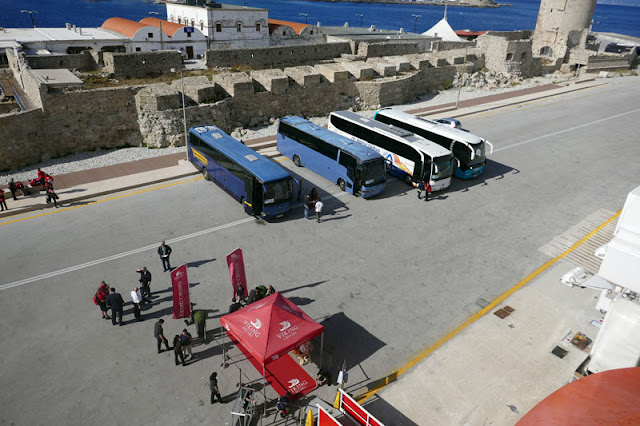 |
| Small oval beach rocks for pavement. |
We
arrived in the port of Rhodes mid-day and from our ship could see the medieval
walls that surround the old town. Much of what we saw dated from the time when the Crusaders occupied Rhodes. We spent the better
part of two days docked there and had an interesting tour each day. The town was on the port’s doorstep, so we hung out in town both days
and walked back to the ship when we were ready.

The
view from our balcony. The ship’s staff and tour guides are preparing to take
us out on scheduled tours. Today most of us walked through town. Only a few
tours required buses.

Looking
toward town from our stateroom


 |
| Rhodes is Europe’s largest inhabited medieval town. |
The main focus of the walking tour on the first day was the old city and the palace of the Grand Masters.
As Don
and I have put this blog together we have researched about the things we saw to make
sure we get it right. Here is a mix of what I learned on our tour and what I
got off the Web about the palace of the Grand Masters.
The
palace was originally built in the late 7th century as a Byzantine citadel.
After the Crusader Knights occupied the island they converted the
fortress into their administrative center and that it was the palace of their Grand Master.
After the
island was captured by the Ottoman Empire, the palace was used as a command center and fortress. Much of the palace was severely damaged by an
ammunition explosion in 1856. As a result, many rooms in the second floor were
destroyed.
During
the Italian rule of Rhodes, the Italian architect Vittorio Mesturino restored
the damaged parts of the palace between 1937 and 1940. It became a holiday
residence for the King of Italy, Victor Emmanuel III, and later was outfitted for Mussolini, whose name can still be seen on a large plaque near
the entrance. (although he never visited).
After the Second World War, Rhodes became part of Greece and the Palace became a museum. Here are some photos we took inside the palace...
The fascinating thing is all of the medieval buildings in Rhodes are in use as homes, offices and businesses. I wonder what it would be like living in a 700 year old building?
I took a lot of photos in Rhodes of walls and streets because of all of the lovely textures, materials and colors. Below are a few...
 |
| The upper window is made of alabaster |
 |
When
the Italians restored the palace they pilfered works of art from around Greece
and put them in the palace.
|
 |
| This is a bitter orange tree. The fruit is not eatable. They were everywhere and the fruit is left on until Christmas to serve as Christmas decorations. |
 |
| This area is called the Street of the Knights and there was a building for each order of the Crusader Knights. The coat of arms for each one is in stone. |
I took a lot of photos in Rhodes of walls and streets because of all of the lovely textures, materials and colors. Below are a few...
 |
It was during Turkish rule that the streets were paved with
these small stones.
|
 |
| This is the wall of a Mosque |
 |
| Rain was forecast for the next day. |


No comments:
Post a Comment